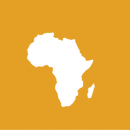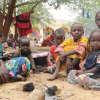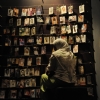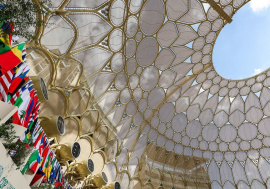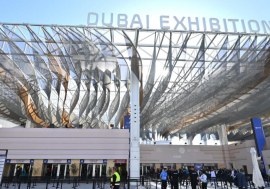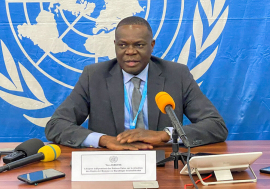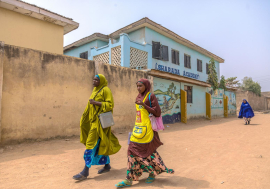‘Peer review’ and civil society keep African leaders on their toes
‘Peer review’ and civil society keep African leaders on their toes
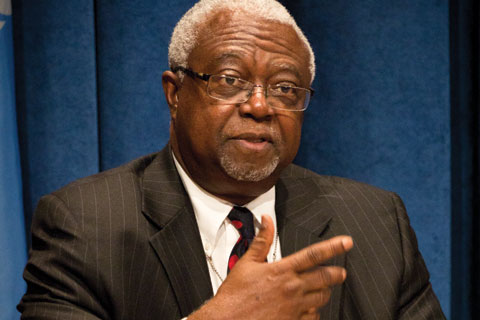 “We can build our democratic systems,” says Amos Sawyer of the Peer Review's Panel of Eminent Persons.
“We can build our democratic systems,” says Amos Sawyer of the Peer Review's Panel of Eminent Persons.Since the democratization wave of the 1990s there have been many different governance initiatives in Africa. What’s unique about the Peer Review Mechanism? What does it add?
It adds several things. First, it is a self-assessment, done by the country itself, in an all-inclusive way: government, civil society, the business community. Second, it is a peer review. It is held by the African governments themselves. Peers from outside sit together with the leadership of the country. That engagement involves constructive criticism, illustrations of best practices. But it doesn’t end there. A programme of action is formulated, and the head of state being reviewed has an obligation to come back to his colleagues every two years to report on the progress that has been made.
It is slow. It is not confrontational. But a country that does it right has windows opened for the international community to support its development programmes. It strengthens its systems of governance, because the very methodology compels countries to engage with their own constituencies.
You have spoken about the peer review as putting into practice the spirit of the Arusha Declaration of 1990.*
Yes, I think so. The 1990 popular participation conference urged bringing out the human potential in the developmental process, that trade unions, farmers’ groups, all should be involved in governance. We should move beyond thinking about “the government” and start thinking about “governance,” which admits the interaction of various constituencies of people. The peer review is giving some practical implementation to that.
The Arusha conference was organized by the UN, but also had civil society involvement. NEPAD was initiated by some African heads of state. The peer review seems to combine the two. You have people on the Panel of Eminent Persons who come from civil society, but at the end of the process the review goes to African heads of state for approval. Do you see any tension there?
Yes. In fact we are working on that. One of the issues suggested by civil society groups in Africa is that the review process at the level of the heads of state should either take place with the involvement of civil society or there should be a concurrent process where civil society would have its own take on the report. I wouldn’t be surprised if in a few more years we see some changes.
In some countries that have gone through a peer review, civil society groups complained that those who were able to participate were mainly government-approved.
You have a mixed bag of cases. There are some countries in which civil society is not only well organized, but has demanded and therefore achieved a presence in the political process. In other places civil societies are still fighting to get a seat at the table and organizing themselves to build their capabilities. Where there is weak civil society input, we note that very strongly in all of the reports. And in the programme of action we will note that civil society empowerment is a major project that should be undertaken.
There are controversies about what civil society is. We encourage governments to engage the various groups and associations and come up not only with a working definition, but a space for participation of non-governmental organizations within the policy process.
The most recent accession to the APRM is your own country, Liberia. Do countries coming out of war need a little time to settle before a peer review would be useful?
I think it’s just about the right time for Liberia. A country coming out of conflict needs to put its institutions right. And it’s good when you are newly establishing your institutions for them to conform to the standards that are required by the peer review process. The legislature, for example, should be free from executive control. Legislators should undertake their constituency responsibilities seriously. The judiciary should be independent and well funded, giving people access. Civil society participation should be respected. And [the peer review] can help us correct whatever we are doing that may not be done properly.
Some issues, like corruption, gender and climate change, affect many countries.
Many of these issues are cross-cutting, not only because they touch everything in the national agenda, but some of them cross borders and are of continent-wide concern. Especially corruption, which is due to a lot of factors, including how institutions function, patrimonialism and the system of governance. Every African country has a little bit of this, so it’s an issue that everybody wants to talk about. Land grabbing is becoming a problem, the lack of land access for women and vulnerable groups, the struggle between plantation agriculture and small food production — every country has this problem to deal with. The extent to which we can address such issues together and form ideas is very helpful.
What we are also discussing is that the governance arrangements in some of these areas have to be designed differently. Sometimes you have to think outside the box, beyond the nation-state. If you have a pastoral group moving seasonally to where the greener lands are, that requires a different kind of governing arrangement, an authority that can look after them whatever country they come from. We have to learn to talk about an authority that might cross two or three borders.
How thorough is the implementation of the national programmes of action that come out of the peer reviews?
The programme of action is constituted not only by the government alone, but also with civil society and private sector involvement. It speaks directly to the challenges identified in the self-assessment report, so it’s targeted. The problem is that you also have the poverty reduction strategy or the medium-term development plan, which sometimes look to other priorities. We shouldn’t be talking about separate compartments. We should be talking about doing this together. Some have done it another way, using the programme of action as their development programme. Mauritius is doing that right now.
How do you know the APRM is having an impact?
How do we know the APRM is working? Sadly, we know all too soon when it is not working. At the 2006 review of Kenya, four or five critical issues were singled out in the report. Those came back to haunt us, with the electoral violence [in 2007–08]. Now, from the office of the president down to civil society, they all say that if they had followed the report they could have avoided many problems. Now Kenya is following the plan and a good deal of progress has been made.
In South Africa we raised the issue of xenophobia. I was not a member of the panel, but a consultant in the preparation of that report. At first there was denial. At many sticking points the South African government felt that we were wrong. But the panel member who was in charge of the process stuck to the report and it went through. South Africa has now come around to the problem [of xenophobia], unfortunately after it blew up [in violence in 2008].
In normal cases we follow the implementation of the plan of action and every two years the country has to write a report. Some countries are behind in coming forth, but the reports that are made are taken very seriously. Countries may be asked for special reviews if problems are continuing to occur. We are still perfecting the mechanism for monitoring, and we will get that over time.
Thirty countries have acceded to the APRM, but only some have gone through a full review. What is the problem?
Thirty countries have acceded, 14 have completed. Another two are on the way and by January will be finished. Another, Tanzania, has invited the commission to come in, and that will be done. We are told that Gabon, the Republic of Congo and Liberia are preparing. So we still have quite a few to work on, at least 10 or so.
We have recently come up with a policy of reengaging those countries that have not been forthcoming. We are planning visits to see how we can get them to move forward quickly on the peer review process. Now, that’s still just 30 out of Africa’s 54 states. So we have a lot of work to do with those that have not shown any interest at all.
We encourage African leaders to join their colleagues. I have been impressed at the sessions where leaders engage each other. The discussions are really substantive. The questions are straight-forward, made in a polite and respectful manner. I have seen leaders say, “We didn’t do this right. We’ll come back to you next time and we will have improved.” I think such peer pressure can be more powerful than many other pressures. I have a lot of faith that if we do the peer review right, it can make a significant contribution to the establishment and the sustenance of good governance in Africa.
For a number of years NEPAD was outside the main structure of the African Union (AU). Now it is more integrated. What is the APRM’s status?
I think we are following the path of NEPAD. So far the forum of heads of state is the sovereign body of the APRM. That may well remain the same, I don’t know. But what is being done now is to work towards getting the APRM to become an agency within the AU much like NEPAD. This might mean a change in the organizational structure, in the way the APRM relates to the AU. It might even change the voluntary nature of participation. All of this has to be worked out.
The integrity of the panel is key. Whatever changes are made, anything that compromises the integrity of the panel is not a good idea.
Any final thoughts?
I know that this idea of a peer review comes against the background of an Africa in which we see some of our leaders sitting tight, some are authoritarian, some are participating in corruption. While some of this is true, I think the idea of involving African leaders themselves in a transparent process of self-examination and peer review has some strong merits. It can produce significant results that are beneficial for Africa. We need to encourage this process. We need to have it supported. We need to encourage and strengthen civil societies so they become significant players. In this way we can build our democratic systems and governments, as well as tighten up on accountability and transparency. I am hopeful.
— Africa Renewal online
* The African Charter on Popular Participation in Development and Transformation, also known as the Arusha Declaration on Popular Participation, was adopted at a conference of 500 African civil society, government, donor and UN representatives, organized by the UN in Arusha, Tanzania, in February 1990.

